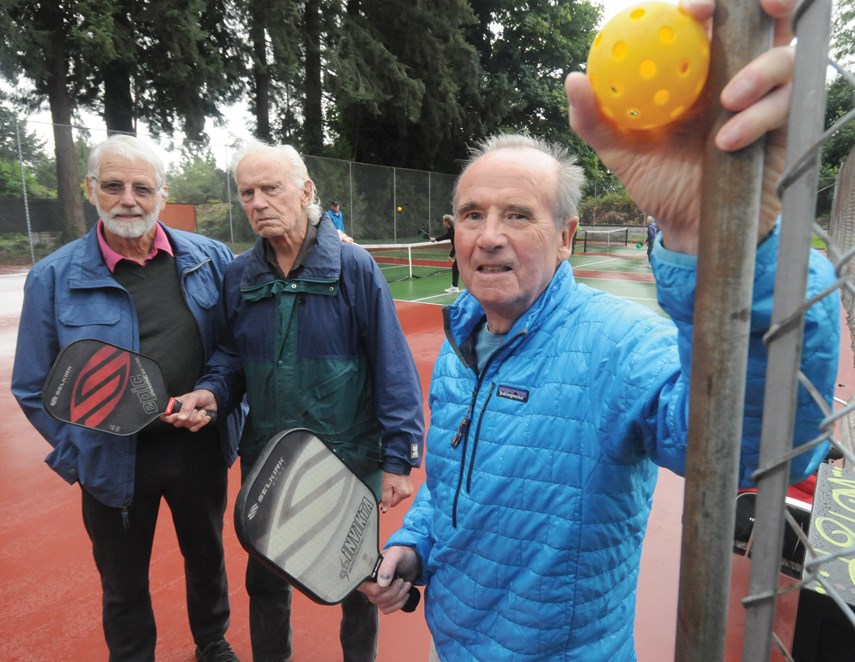The North Shore pickleball war has opened up on a new front, as players in West Vancouver say they are not satisfied with the outdoor court options available to them.
This comes after a summer flare-up in neighbouring North Vancouver where more than 50 tennis players held a sit-in to protest a plan to paint pickleball lines on a local tennis court to make the space usable for both tennis and pickleball.
The pickleball problem seemingly continues to pop up for a couple of reasons. No 1 is that the sport – a kind of hybrid version of tennis, ping pong and badminton – is becoming ever more popular, particularly among older people who enjoy its social elements as well as its relatively low-impact play format. The popularity of the sport has pickleball aficionados petitioning local governments for more facilities and pushing their way onto existing tennis courts that can be converted into makeshift pickleball facilities.
The second pickleball problem is the racket. Not the paddle itself, but the noise that it creates when it hits the hard plastic ball used in the sport. Each stroke makes a distinct – and loud – "poc!" sound that has been known to upset nearby residential neighbours or park users.
With those terms of engagement setting the backdrop, pickleball players in West Vancouver are asking for more and better outdoor court options than those currently available.
Three outdoor pickleball courts opened in West Van at 29th Street and Marine Drive in 2019 – the only such outdoor courts in the district – and they have been well used ever since.
“It’s very popular,” said North Shore Pickleball Club member Reg Allen, a 78-year-old West Vancouver resident who has fallen in love with the sport. “We’ll always fill three courts every morning and we’ll have people waiting.”
The new courts, however, haven’t been a big hit with everyone in the neighbourhood. Noise complaints from the neighbours prompted the district to limit the hours of play on the court, locking the gate every night at 6 p.m. and reopening it (hopefully) at 9 a.m. the next morning.
Allen also said that the court has been vandalized three times this year, including two incidents of eggs being thrown on the court and another in which a gross greasy substance was splashed on the court surface.
Allen said he can understand the noise of the sport might be bothersome, but the players aren’t out there to make anyone upset.
“The pickleball, when it hits one of the paddles, it does make a kind of a noise,” he said. “But we’ve never been a rowdy bunch. We’re responsive and responsible. It’s not like we’re a bunch of hooligans playing music and drinking beer, we’re just out to play pickleball.”
What the pickleball players are hoping for now is that the district will stop restricting the hours of play at 29th Street – players attended a protest at city hall over the summer and also submitted a petition with 138 signatures on it asking for that change to be made. The players are also hoping that in the near future the district will find another location for a larger pickleball-specific facility – at least six courts are needed, said Allen – where they won’t upset the neighbours.
That, however, is a tall order given the availability of land in the municipality, according to West Vancouver District spokeswoman Donna Powers.
“As a long, narrow, geographically constrained area, there are very few options available for pickleball courts, especially given the fact that pickleball is not really compatible with residential neighbourhoods,” said Powers.
The district has looked into several locations around West Vancouver, and their current plan is to replace the three 29th Street courts with three new courts in Ambleside Park by next summer, said Powers.
The district also has a current practice that when more than one tennis court is redone, pickleball lines are painted on one of the tennis courts to allowed shared use between tennis players and pickleball players, said Powers.
West Van pickleball players have also suggested Hugo Ray Park as a good location for more dedicated pickleball courts, but it will take further study from the district to determine if a suitable location for courts can be found there, said Powers.
In the meantime, the district will continue to restrict the hours of play at 29th Street due to noise complaints from the neighbours, said Powers.
“The district encourages pickleball players to invest in quieter equipment and to be considerate of adjacent residents,” she said.
The current plan proposed by the district falls well short of what West Van players need, said Allen.
“The worst thing that could happen would be for them to just build another three courts somewhere,” he said. “That would be so short-sighted. … I think this an opportunity for West Van to step forward and create a facility for such a wide range of residents.”
The sport is important to those who play it, and more and more people are getting into it, said Allen.
“It creates an activity that has been really important during the COVID lockdown. I couldn't go to the gym and things. So I'm getting activity, keeping me healthy, and I'm meeting new people. And I'm competitive and it's a sport, and I like all of those things.”
The beauty of pickleball is its simplicity and accessibility for a wide range of ages and skill levels, said Allen.
“You don’t have to spend a long time learning it in order to enjoy it. It’s sort of almost instant,” he said.
“It becomes something that is almost addictive, where you want to go out and do it again and get better at it.”


